Executive Assessment Mock Test - 3 - GMAT MCQ
30 Questions MCQ Test - Executive Assessment Mock Test - 3
Directions: Each multi-source reasoning question is based on a series of information contained in text, charts, or tables. For each practice you should examine the relevant information and select the best answer of the choices given.
Article - 1
News article in an environmental publication.
July 19 – If current trends continue, fossil fuels will be exhausted by 2052. Industry and transportation and the inability of governments to put stricter emissions regulations in place means that there will be a greater demand for alternative energy sources. Additionally, recent concerns about the high-cost of implementing new systems such as public transportation in industrialized areas has led many voters to actually strike down propositions to subsidize alternative fuel research.
Article - 2
Interview with a well-known scientist.
August 3 – Dr. Lisa Goodman, one of the team of architects behind several new battery-operated commercial vehicles, has criticized the government’s unwillingness to aggressively lobby voters to pass measures to reduce fossil fuel usage. She suggests that without a significant reduction in per-person fossil fuel consumption, the rate of global warming could soon increase threefold.
“I know that voters continue to reject costly measures to reduce widespread fossil fuel consumption such as large-scale public transportation projects, and that politicians are naturally going to avoid stumping for unpopular policies. However, if something isn’t done soon, by 2055, a barrel of gasoline may become a luxury that only the rich can afford.”
Article - 3
Article from a weekly news magazine.
August 29 – The price of crude oil has jumped by 500% over the last decade as a decrease in supply has met with an increased demand. This demand has encouraged many new oil wells to launch in the Gulf of Mexico, and some American environmental groups have expressed concern that certain oil companies are not following the safest procedures, emphasizing that the companies are more concerned with the speed of extraction than the well-being of the ecosystem. Some scientists in the Gulf have called for an increase in safety regulations for oil companies drilling off the coast, but the companies warn that this may dramatically increase the cost of crude oil, at a time when many Americans are already struggling to pay the increased price.
Consider each of the following statements. Does the information in the three articles support the inference as stated?
Q. Politicians usually do not agree with one another on issues of global warming and fossil fuel consumption.
Article - 3
Article from a weekly news magazine.
Directions: Each multi-source reasoning question is based on a series of information contained in text, charts, or tables. For each practice you should examine the relevant information and select the best answer of the choices given.
Article - 1
News article in an environmental publication.
July 19 – If current trends continue, fossil fuels will be exhausted by 2052. Industry and transportation and the inability of governments to put stricter emissions regulations in place means that there will be a greater demand for alternative energy sources. Additionally, recent concerns about the high-cost of implementing new systems such as public transportation in industrialized areas has led many voters to actually strike down propositions to subsidize alternative fuel research.
Article - 2
Interview with a well-known scientist.
August 3 – Dr. Lisa Goodman, one of the team of architects behind several new battery-operated commercial vehicles, has criticized the government’s unwillingness to aggressively lobby voters to pass measures to reduce fossil fuel usage. She suggests that without a significant reduction in per-person fossil fuel consumption, the rate of global warming could soon increase threefold.
“I know that voters continue to reject costly measures to reduce widespread fossil fuel consumption such as large-scale public transportation projects, and that politicians are naturally going to avoid stumping for unpopular policies. However, if something isn’t done soon, by 2055, a barrel of gasoline may become a luxury that only the rich can afford.”
Article - 3
Article from a weekly news magazine.
August 29 – The price of crude oil has jumped by 500% over the last decade as a decrease in supply has met with an increased demand. This demand has encouraged many new oil wells to launch in the Gulf of Mexico, and some American environmental groups have expressed concern that certain oil companies are not following the safest procedures, emphasizing that the companies are more concerned with the speed of extraction than the well-being of the ecosystem. Some scientists in the Gulf have called for an increase in safety regulations for oil companies drilling off the coast, but the companies warn that this may dramatically increase the cost of crude oil, at a time when many Americans are already struggling to pay the increased price.
Consider each of the following statements. Does the information in the three articles support the inference as stated?
Q. An increase in worldwide demand for crude oil has made the oil companies' safety standards fall.
News article in an environmental publication.
Interview with a well-known scientist.
Article - 3
Article from a weekly news magazine.
Directions: Each multi-source reasoning question is based on a series of information contained in text, charts, or tables. For each practice you should examine the relevant information and select the best answer of the choices given.
Article - 1
News article in an environmental publication.
July 19 – If current trends continue, fossil fuels will be exhausted by 2052. Industry and transportation and the inability of governments to put stricter emissions regulations in place means that there will be a greater demand for alternative energy sources. Additionally, recent concerns about the high-cost of implementing new systems such as public transportation in industrialized areas has led many voters to actually strike down propositions to subsidize alternative fuel research.
Article - 2
Interview with a well-known scientist.
August 3 – Dr. Lisa Goodman, one of the team of architects behind several new battery-operated commercial vehicles, has criticized the government’s unwillingness to aggressively lobby voters to pass measures to reduce fossil fuel usage. She suggests that without a significant reduction in per-person fossil fuel consumption, the rate of global warming could soon increase threefold.
“I know that voters continue to reject costly measures to reduce widespread fossil fuel consumption such as large-scale public transportation projects, and that politicians are naturally going to avoid stumping for unpopular policies. However, if something isn’t done soon, by 2055, a barrel of gasoline may become a luxury that only the rich can afford.”
Article - 3
Article from a weekly news magazine.
August 29 – The price of crude oil has jumped by 500% over the last decade as a decrease in supply has met with an increased demand. This demand has encouraged many new oil wells to launch in the Gulf of Mexico, and some American environmental groups have expressed concern that certain oil companies are not following the safest procedures, emphasizing that the companies are more concerned with the speed of extraction than the well-being of the ecosystem. Some scientists in the Gulf have called for an increase in safety regulations for oil companies drilling off the coast, but the companies warn that this may dramatically increase the cost of crude oil, at a time when many Americans are already struggling to pay the increased price.
Consider each of the following statements. Does the information in the three articles support the inference as stated?
Q. Dr. Goodman would likely support a public referendum on whether to require the oil companies to have better safety and ecological regulations.
News article in an environmental publication.
Interview with a well-known scientist.
Article - 3
Article from a weekly news magazine.
Directions: Each multi-source reasoning question is based on a series of information contained in text, charts, or tables. For each practice you should examine the relevant information and select the best answer of the choices given.
Article - 1
News article in an environmental publication.
July 19 – If current trends continue, fossil fuels will be exhausted by 2052. Industry and transportation and the inability of governments to put stricter emissions regulations in place means that there will be a greater demand for alternative energy sources. Additionally, recent concerns about the high-cost of implementing new systems such as public transportation in industrialized areas has led many voters to actually strike down propositions to subsidize alternative fuel research.
Article - 2
Interview with a well-known scientist.
August 3 – Dr. Lisa Goodman, one of the team of architects behind several new battery-operated commercial vehicles, has criticized the government’s unwillingness to aggressively lobby voters to pass measures to reduce fossil fuel usage. She suggests that without a significant reduction in per-person fossil fuel consumption, the rate of global warming could soon increase threefold.
“I know that voters continue to reject costly measures to reduce widespread fossil fuel consumption such as large-scale public transportation projects, and that politicians are naturally going to avoid stumping for unpopular policies. However, if something isn’t done soon, by 2055, a barrel of gasoline may become a luxury that only the rich can afford.”
Article - 3
Article from a weekly news magazine.
August 29 – The price of crude oil has jumped by 500% over the last decade as a decrease in supply has met with an increased demand. This demand has encouraged many new oil wells to launch in the Gulf of Mexico, and some American environmental groups have expressed concern that certain oil companies are not following the safest procedures, emphasizing that the companies are more concerned with the speed of extraction than the well-being of the ecosystem. Some scientists in the Gulf have called for an increase in safety regulations for oil companies drilling off the coast, but the companies warn that this may dramatically increase the cost of crude oil, at a time when many Americans are already struggling to pay the increased price.
Consider each of the following statements. Does the information in the three articles support the inference as stated?
Q. The actions of the oil companies have led some voters to reject measures they consider costly.
Directions: Each multi-source reasoning question is based on a series of information contained in text, charts, or tables. For each practice you should examine the relevant information and select the best answer of the choices given.
Article - 1
News article in an environmental publication.
July 19 – If current trends continue, fossil fuels will be exhausted by 2052. Industry and transportation and the inability of governments to put stricter emissions regulations in place means that there will be a greater demand for alternative energy sources. Additionally, recent concerns about the high-cost of implementing new systems such as public transportation in industrialized areas has led many voters to actually strike down propositions to subsidize alternative fuel research.
Article - 2
Interview with a well-known scientist.
August 3 – Dr. Lisa Goodman, one of the team of architects behind several new battery-operated commercial vehicles, has criticized the government’s unwillingness to aggressively lobby voters to pass measures to reduce fossil fuel usage. She suggests that without a significant reduction in per-person fossil fuel consumption, the rate of global warming could soon increase threefold.
“I know that voters continue to reject costly measures to reduce widespread fossil fuel consumption such as large-scale public transportation projects, and that politicians are naturally going to avoid stumping for unpopular policies. However, if something isn’t done soon, by 2055, a barrel of gasoline may become a luxury that only the rich can afford.”
Article - 3
Article from a weekly news magazine.
August 29 – The price of crude oil has jumped by 500% over the last decade as a decrease in supply has met with an increased demand. This demand has encouraged many new oil wells to launch in the Gulf of Mexico, and some American environmental groups have expressed concern that certain oil companies are not following the safest procedures, emphasizing that the companies are more concerned with the speed of extraction than the well-being of the ecosystem. Some scientists in the Gulf have called for an increase in safety regulations for oil companies drilling off the coast, but the companies warn that this may dramatically increase the cost of crude oil, at a time when many Americans are already struggling to pay the increased price.
Consider each of the following statements. Does the information in the three articles support the inference as stated?
Q. An increase in supply would help reduce the impact the oil companies are having on the Gulf’s environment.
Directions: Each multi-source reasoning question is based on a series of information contained in text, charts, or tables. For each practice you should examine the relevant information and select the best answer of the choices given.
Article - 1
News article in an environmental publication.
July 19 – If current trends continue, fossil fuels will be exhausted by 2052. Industry and transportation and the inability of governments to put stricter emissions regulations in place means that there will be a greater demand for alternative energy sources. Additionally, recent concerns about the high-cost of implementing new systems such as public transportation in industrialized areas has led many voters to actually strike down propositions to subsidize alternative fuel research.
Article - 2
Interview with a well-known scientist.
August 3 – Dr. Lisa Goodman, one of the team of architects behind several new battery-operated commercial vehicles, has criticized the government’s unwillingness to aggressively lobby voters to pass measures to reduce fossil fuel usage. She suggests that without a significant reduction in per-person fossil fuel consumption, the rate of global warming could soon increase threefold.
“I know that voters continue to reject costly measures to reduce widespread fossil fuel consumption such as large-scale public transportation projects, and that politicians are naturally going to avoid stumping for unpopular policies. However, if something isn’t done soon, by 2055, a barrel of gasoline may become a luxury that only the rich can afford.”
Article - 3
Article from a weekly news magazine.
August 29 – The price of crude oil has jumped by 500% over the last decade as a decrease in supply has met with an increased demand. This demand has encouraged many new oil wells to launch in the Gulf of Mexico, and some American environmental groups have expressed concern that certain oil companies are not following the safest procedures, emphasizing that the companies are more concerned with the speed of extraction than the well-being of the ecosystem. Some scientists in the Gulf have called for an increase in safety regulations for oil companies drilling off the coast, but the companies warn that this may dramatically increase the cost of crude oil, at a time when many Americans are already struggling to pay the increased price.
Consider each of the following statements. Does the information in the three articles support the inference as stated?
Q. If the change in oil price continues trending in the exact same way, by 2055, the price of oil will be 2000% higher than where it is now.
Directions: Carefully review each of the graphs and then choose the best answer from the choices below.
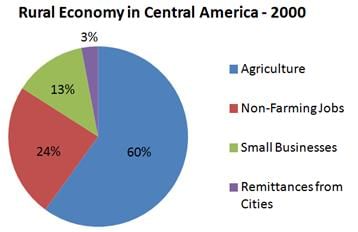
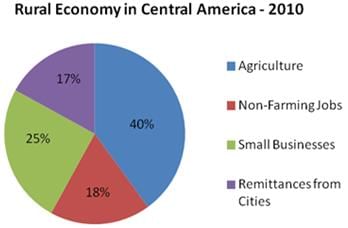
The above pie charts give the percentages of the rural economy in a Central American country for the years 2000 and 2010.
Q. The change in the overall earnings for non-farming jobs plus small businesses between 2000 and 2010
Directions: Carefully review each of the graphs and then choose the best answer from the choices below.
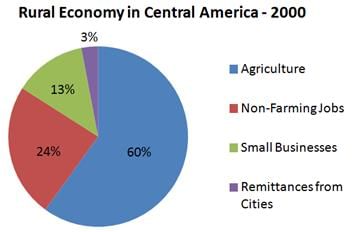
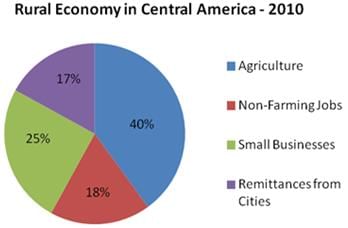
The above pie charts give the percentages of the rural economy in a Central American country for the years 2000 and 2010.
Q. The smallest proportional change in percent between 2000 and 2010 in any segment of the rural economy was in
Directions: Carefully review each of the graphs and then choose the best answer from the choices below.
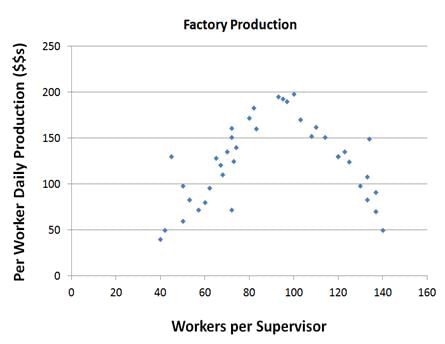
Q. Assuming the trend in the graph stays the same over the range of workers per supervisor values, if the company were to employ 20 workers per supervisor they would likely be __________ productive than if the company were to employ 160 workers per supervisor.
Directions: Carefully review each of the graphs and then choose the best answer from the choices below.
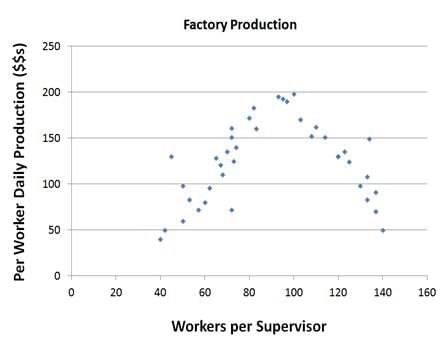
Q. If it wanted to increase productivity, a company currently employing 115 workers per supervisor should consider
Directions: Read the given passage carefully and answer the question as follow:
No one thing over which we have control exerts so marked an influence upon our physical prosperity as the food we eat; and it is no exaggeration to say that well-selected and scientifically prepared food renders the partaker whose digestion permits of it being well assimilated, superior to his fellow-mortals in those qualities which will enable him to cope most successfully with life’s difficulties, and to fulfil the purpose of existence in the best and truest manner. The brain and other organs of the body are affected by the quality of the blood which nourishes them, and since the blood is made from the food eaten, it follows that the use of poor food will result in poor blood, poor muscles, poor brains, and poor bodies, incapable of first-class work in any capacity. Very few persons, however, ever stop to inquire what particular foods are best adapted to the manufacture of good blood and the maintenance of perfect health; but whatever gratifies the palate or is most conveniently obtained, is cooked and eaten without regard to its dietetic value.
The subject of diet and its relation to human welfare, is one deserving of the most careful consideration. It should be studied as a science, to enable us to choose such materials as are best adapted to our needs under the varying circumstances of climate, occupation, and the numerous changing conditions of the human system; as an art, that we may become so skilled in the preparation of the articles elected as to make them both appetizing and healthful. The mechanical mixing of ingredients is not sufficient to secure good results; and many of the failures attributed to “poor material,” “bad luck,” and various other subterfuges to which cooks ignorance of scientific principles. The common method of blindly following recipes, with no knowledge of “the reason why,” can hardly fail to be often productive of unsatisfactory results, which to the uninformed seem quite inexplicable.
Cookery, when based upon scientific principles, ceases to be the difficult problem it so often appears. Cause and effect follow each other as certainly in the preparation of food as in other things; and with knowledge of the underlying principles, and faithfulness in carrying out the necessary details, failure becomes almost an impossibility. There is no department of human activity where applied science offers greater advantages than in that of cookery.
Q. What is the primary concern of the author in writing the passage?
Directions: Read the given passage carefully and answer the question as follow:
No one thing over which we have control exerts so marked an influence upon our physical prosperity as the food we eat; and it is no exaggeration to say that well-selected and scientifically prepared food renders the partaker whose digestion permits of it being well assimilated, superior to his fellow-mortals in those qualities which will enable him to cope most successfully with life’s difficulties, and to fulfil the purpose of existence in the best and truest manner. The brain and other organs of the body are affected by the quality of the blood which nourishes them, and since the blood is made from the food eaten, it follows that the use of poor food will result in poor blood, poor muscles, poor brains, and poor bodies, incapable of first-class work in any capacity. Very few persons, however, ever stop to inquire what particular foods are best adapted to the manufacture of good blood and the maintenance of perfect health; but whatever gratifies the palate or is most conveniently obtained, is cooked and eaten without regard to its dietetic value.
The subject of diet and its relation to human welfare, is one deserving of the most careful consideration. It should be studied as a science, to enable us to choose such materials as are best adapted to our needs under the varying circumstances of climate, occupation, and the numerous changing conditions of the human system; as an art, that we may become so skilled in the preparation of the articles elected as to make them both appetizing and healthful. The mechanical mixing of ingredients is not sufficient to secure good results; and many of the failures attributed to “poor material,” “bad luck,” and various other subterfuges to which cooks ignorance of scientific principles. The common method of blindly following recipes, with no knowledge of “the reason why,” can hardly fail to be often productive of unsatisfactory results, which to the uninformed seem quite inexplicable.
Cookery, when based upon scientific principles, ceases to be the difficult problem it so often appears. Cause and effect follow each other as certainly in the preparation of food as in other things; and with knowledge of the underlying principles, and faithfulness in carrying out the necessary details, failure becomes almost an impossibility. There is no department of human activity where applied science offers greater advantages than in that of cookery.
Q. 3. It can be inferred from the passage that:
Directions: Read the given passage carefully and answer the question as follow:
No one thing over which we have control exerts so marked an influence upon our physical prosperity as the food we eat; and it is no exaggeration to say that well-selected and scientifically prepared food renders the partaker whose digestion permits of it being well assimilated, superior to his fellow-mortals in those qualities which will enable him to cope most successfully with life’s difficulties, and to fulfil the purpose of existence in the best and truest manner. The brain and other organs of the body are affected by the quality of the blood which nourishes them, and since the blood is made from the food eaten, it follows that the use of poor food will result in poor blood, poor muscles, poor brains, and poor bodies, incapable of first-class work in any capacity. Very few persons, however, ever stop to inquire what particular foods are best adapted to the manufacture of good blood and the maintenance of perfect health; but whatever gratifies the palate or is most conveniently obtained, is cooked and eaten without regard to its dietetic value.
The subject of diet and its relation to human welfare, is one deserving of the most careful consideration. It should be studied as a science, to enable us to choose such materials as are best adapted to our needs under the varying circumstances of climate, occupation, and the numerous changing conditions of the human system; as an art, that we may become so skilled in the preparation of the articles elected as to make them both appetizing and healthful. The mechanical mixing of ingredients is not sufficient to secure good results; and many of the failures attributed to “poor material,” “bad luck,” and various other subterfuges to which cooks ignorance of scientific principles. The common method of blindly following recipes, with no knowledge of “the reason why,” can hardly fail to be often productive of unsatisfactory results, which to the uninformed seem quite inexplicable.
Cookery, when based upon scientific principles, ceases to be the difficult problem it so often appears. Cause and effect follow each other as certainly in the preparation of food as in other things; and with knowledge of the underlying principles, and faithfulness in carrying out the necessary details, failure becomes almost an impossibility. There is no department of human activity where applied science offers greater advantages than in that of cookery.
Q. 2. Which of the following is not likely to be a beneficial effect of scientifically prepared food on humans?
Most scientists believe that the decay of the ozone layer is a cause of global warming. With a weaker ozone layer, additional wavelengths of light reach the earth. However, the danger posed by ozone decay is not limited to global warming. The decay of the ozone layer, which enables more harmful wavelengths of light to reach the earth's surface, is also believed to cause permanent eye damage in some animals.
Q. Which of the following is most strongly supported by the statements above?
As a result of changes in cultural norms and dynamics, a boutique financial research company is considering implementing flex-time, which enables employees to work during any time of the day from any location as long as they are present at the office from 12:30pm to 3:30pm on weekdays. By comparison, workers currently must be in the office from 8am to 5pm. Firm management believes this change will help meet three key goals: decrease total costs, increase productivity, and improve product quality.
Q. Which of the following, if true, most weakens the argument of firm's management?
Due to significant advances in biotechnology, experts predict that within years, doctors will be able to trace the genetic roots of common medical problems such as depression and bi-polar syndrome. As a result, some physicians predict that these conditions and others like them will be all but eliminated through early identification and genetic therapy.
Q. The argument above is based most heavily upon which of the following assumptions?
During the early months of 2009, some economists concluded that the slew of U.S. government programs created during the fall of 2008 to stabilize an economy marked by an absence of credit, a wave of enormous asset write downs, a precipitous decline in housing prices, and a historic loss of consumer confidence has not succeeded in engendering healthy intra-bank credit flows and reviving depressed equity prices.
During the 1992 Presidential campaign, President George H. W. Bush and his promise four years earlier to never raise taxes experienced considerable criticism from economic conservatives who felt betrayed by Bush's 1990 tax-hike, which he implemented over the objections of economic conservatives who decried tax hikes, insisted that low taxes created wealth, and contended that deregulation promoted innovation.
The first United States Solicitor General, Benjamin H. Bristow, born in 1832 and served in the Grant administration from 1874 to 1876. Earlier in his life, Bristow had served as a lieutenant colonel in the 25th Kentucky Infantry.
Working at a constant rate, a copy machine makes 20 copies of a one-page document per minute. If the machine works at this constant rate, how many hours does it take to make 4,800 copies of a one-page document?
If x+ y= 2 and x2 + y2 = 2, what is the value of xy?
A certain harbor has docking stations along its west and south docks, as shown in the figure; any two adjacent docking stations are separated by a uniform distance d. A certain boat left the west dock from docking station #2 and moved in a straight line diagonally until it reached the south dock. If the boat was at one time directly east of docking station #4 and directly north of docking station #7, at which docking station on the south dock did the boat arrive?
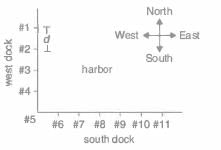
Points A, B, C, and D, in that order, lie on a line. If AB = 3 cm, AC = 4 cm, and BD = 6 cm, what is CD, in
centimeters?
What is the value of x2yz - xyz2, if x = -2, y = 1, and z = 3?
If a salesman received a commission of 3% of the sales that he has booked in a month, what was the sales booked by the salesman in the month of November 2003?
(1) The sales booked by the salesman in the month of November 2003 minus salesman's commission was $245,000
(2) The selling price of the sales booked by the salesman in the month of November 2003 was 125 percent of the original purchase price of $225,000
Is the positive integer 'x' divisible by 12?
(1) x is divisible by 6
(2) x is divisible by 8
Is ab positive?
(1) (a + b)2 < (a-b)2
(2) a = b
Is the two digit positive integer P a prime number?
(1) (P + 2) and (P - 2) are prime.
(2) (P - 4) and (P + 4) are prime.
If m, s are the average and standard deviation of integers a, b, c, and d, is s > 0?
(1) m > a
(2) a + b + c + d = 0















